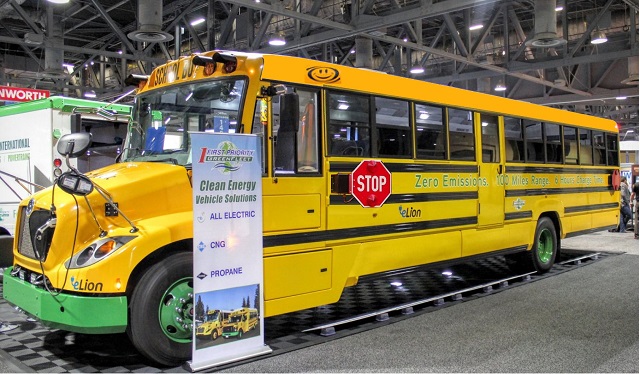
Image Credit: PatrickRich / flickr
School buses are some of the safest vehicles we have on our roads. They check most of the safety boxes as they are apparent and have stop sign features that come in handy when students are boarding and exiting. So, you'd imagine the environmental impact they would have when the clean school bus program brings in new electric buses over the next year.
About 95% of all school buses in America use diesel. Such vehicles are a significant contributor to pollution in the air. They release nitrogen oxide, particulate matter, and hydrocarbons. The release of these three pollutants is a significant threat to the environment. This can cause asthma, heart disease, and cancer. In the US alone, it causes 50,000 premature deaths every year.
Of course, electric cars are good in the long run if we analyze them from an economic perspective. However, multiple studies have steered us in the same direction; a fuel-based economy is hazardous for our environment.

Image Credit: US Department of Education / flickr
Not only that, but this specific study published in the Canadian Medical Association Journal showed that children are exposed to diesel exhaust while riding the school bus for an estimated one to two hours. This leads to increased cancer deaths per 1 million children, especially after prolonged exposure to diesel exhaust.
But fundamental analysts also believe that the move to introduce electric school buses across the country is an environmental justice issue. There are a couple of why this could be. For instance, this move will not only help with ecological preservation, but it could also help large minority groups as they will be affecting all the districts.
Such factors have led us to believe that this move is an environmental justice issue more than an economic or sustainability issue. Here are some reasons why introducing electric buses to schools is an environmental justice issue.
Minority Areas Are Plagued with More Pollution Problems in General
Pollution is a significant problem in many parts of the world. It is a problem that affects everyone, but it disproportionately affects minority communities. This is primarily because minority communities are often located near industrial sites and other sources of pollution. This means they are more likely to be exposed to pollutants than other communities.
The housing policies of the past have significantly impacted the demographics of neighborhoods. The guidelines have pushed minorities to less desirable areas and created a cycle of poverty.
Low and moderate-income families face a disproportionate burden from the emission primarily because their houses are close to the major roads and highways. The push for electric school buses is a great way to lessen the threat of hazardous emissions.
Electric buses are a solution to the pollution problem that has been plaguing minority areas for decades. It is a way to provide sustainable transportation in a way that doesn't affect the environment.
Not only will this help improve the health of the environment, but it also protects children in such communities, allowing them to study and perform better, as explained below.
Children Should Start Performing Better
Air pollution is closely related to low academic performance in children. A study from the University of Texas at El Paso showed that children exposed to toxic air pollutants (such as nitrogen oxide from diesel vehicles) are more likely to have lower GPAs than children who are not.
This means that children in minority groups could have been performing poorly due to their environment. And since traffic pollution is unequal, children from these communities are greatly affected.
Pollution can have many detrimental effects on children's health, such as respiratory diseases, allergies, and asthma, as well as reduced lung capacity and cognitive impairment. Kids from minority groups living in polluted environments also risk developing cancer later in life.
Introducing electric buses is environmental justice as children in these communities can now have better academic achievements while staying safe from the fumes emitted by diesel buses.
Bottom Line
Electric school buses are a great way to reduce the environmental impact of school transportation. They are also a great way to provide equal access to education for all children. Parents, school districts, and all stakeholders are excited about this move.
Introducing electric school buses is an environmentally friendly and sustainable solution that can help reduce schools' carbon footprint. It is also a solution that can help provide equal access to education for all children, notwithstanding their socioeconomic status.
Remember, the burden of pollution exposure has not been evenly distributed. As a result, this has created communities that need investments to correct or lessen the impact of this pollution. This is what analysts are calling environmental justice.



